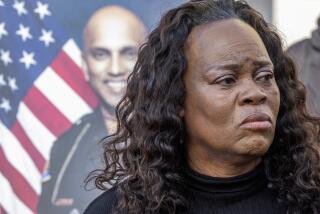Black Leaders Denounce D.A.’s Report on Shooting
- Share via
SAN DIEGO — Officials of the NAACP, Urban League and several other African American community groups Tuesday denounced as “a legal lynching” the ruling by the district attorney that police were justified in fatally shooting former pro-football player Demetrius Dubose.
But the lone African American on the City Council broke sharply with that view and largely supported the conclusion by Dist. Atty. Paul Pfingst that the two officers, both white, were reacting lawfully to a perceived physical threat from Dubose.
“There is not one piece of evidence that these officers shot Mr. Dubose because he is black,” said Councilman George Stevens, his voice rising. “This man whipped the officers. How can you put that into a racial context? You’ve got to cooperate with the police.”
Dubose’s death occurred in the midst of a series of controversial shootings of blacks by police around the nation, including the killing of Tyisha Miller by Riverside police and West African immigrant Amadou Diallo by New York City officers.
Stevens insisted that the Dubose case was fundamentally different from the Miller and Diallo cases because Dubose had been fighting with the officers. But other African American community leaders, at their news conference, saw a common pattern to all three cases, and other instances of African Americans shot to death by police.
“We blacks have to tell our sons and daughters when they go out to be careful to come back alive,” said Carrol Waymon, a community college professor and member of a group of African American psychologists. “White people don’t have to do that.”
Waymon and others blamed the Dubose shooting on the tendency of police to believe that young African American men, by nature, are addicted to drugs and violence and pose a greater risk than men of other races.
Randa Trapp, president of the San Diego branch of the NAACP, said that, “although the shooting has been ruled justified, the African American community has indicted the entire police department.”
The July 24 shooting occurred after Dubose, 28, a former Notre Dame All-American and Tampa Bay Buccaneer linebacker, refused to be handcuffed while being questioned about why he had entered a neighbor’s apartment without permission and fallen asleep. The neighbor had called police.
Officers tried to handcuff Dubose after he told them that he had once been arrested for drugs. “The hair on the back of my neck stood up, because I realized he was under the influence of PCP,” one of the officers later told investigators.
(An autopsy found alcohol, cocaine and the drug ecstasy, but not PCP.)
As Dubose tried to flee, the officers used pepper spray and their nunchaku martial-arts weapons. Dubose threw one officer to the ground and took away the nunchakus from both officers.
When Dubose, 6 feet, 2 inches and 240 pounds, appeared to advance toward the officers, they shot him 12 times from a distance of seven to 10 feet, according to a report by the district attorney’s office.
“If Mr. Dubose was guilty of anything, he was a proud African American who was guilty only of standing up for his constitutional rights, and who did not want to be stereotyped,” said H.J. Sims, president of a local black lawyers association.
Abdur-Rahim Hameed, president of a black contractors association, said African American men “would be better off shooting it out than being shot down [by police] in cold blood.”
At his news conference, Stevens countered that the officers were justified in shooting Dubose “to address the perceived threat he posed” but that they should have stopped shooting once he was on the ground. Based on his own investigation, Stevens disputed the official version that the shots were fired while Dubose was standing.
Stevens said he plans to seek changes in police training to ensure that police use only the minimum amount of force.
A minister and former civil rights activist, Stevens has been a frequent critic of police during his long and sometimes volatile political career.
But he also has played the role of community peacekeeper and is one of several officials credited with helping San Diego avoid violence when racial tensions became strained after the Simi Valley verdict in the Rodney King beating case.
Stevens, on the verge of announcing his candidacy for mayor, said he is concerned that the Dubose case could exacerbate poor relations between police and African Americans.
“I don’t want San Diego to become another New York or Riverside,” said Stevens, a reference to the continuing racial animosity over the Miller and Diallo shootings.
The disagreement between Stevens and other African American leaders come amid unprecedented attempts by civic officials to avoid repercussions from Pfingst’s decision.
Police Chief David Bejarano plans a community meeting tonight, Mayor Susan Golding has established a hotline, and Pfingst had the entire 368-page report posted on a county Web site. The Dubose family lawyer, who has filed a federal civil rights lawsuit, had already established a Web site dedicated to the case.
More to Read
Sign up for Essential California
The most important California stories and recommendations in your inbox every morning.
You may occasionally receive promotional content from the Los Angeles Times.













